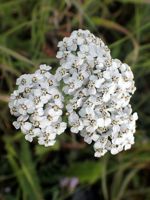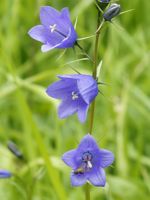Mon-Fri 9am - 5pm Mountain time
Yarrow vs Harebell
Achillea borealis (Previously Achillea millefolium)
Campanula rotundifolia
SOLD OUT
NOT AVAILABLE THIS SEASON - MIGHT RETURN
Yarrow is a herbaceous, native wildflower that is found across Canada. It features large, flat clusters of tiny white flowers. The blooms attract a variety of pollinators, making it an ideal choice for pollinator gardens. While partial shade is tolerated, the best flowering occurs in full sun. Yarrow is resistant to deer and rabbits, making it both a beautiful and practical addition to your landscape.
The entire plant is edible, but leaves and flowers are most commonly consumed. They have a strong licorice scent and a mild sweet flavor that is similar to tarragon. Yarrow leaves can also be used as a natural insect repellent.
It is important to plant Yarrow in the right place, it can spread quickly via both rhizomes and self-seeding. Deadheading the spent flowers will extend the bloom season and can help limit self-seeding.
Harebell is a native perennial wildflower known for its bell-shaped, blue-violet flowers. The noddling blooms occur in clusters at the top of slender stems. Blooming in bursts from summer to fall, the flowers attract pollinators such as butterflies, bees, and hummingbirds.
Regular deadheading encourages additional blooms, extending its floral display through the season. Harebell prefers areas with cooler summer climates and does poorly in those that get too hot and humid. It is well suited for native wildflower gardens, pollinator gardens, and naturalization projects.
Yarrow Quick Facts
Harebell Quick Facts
Toxicity: toxic to dogs, cats, and horses

